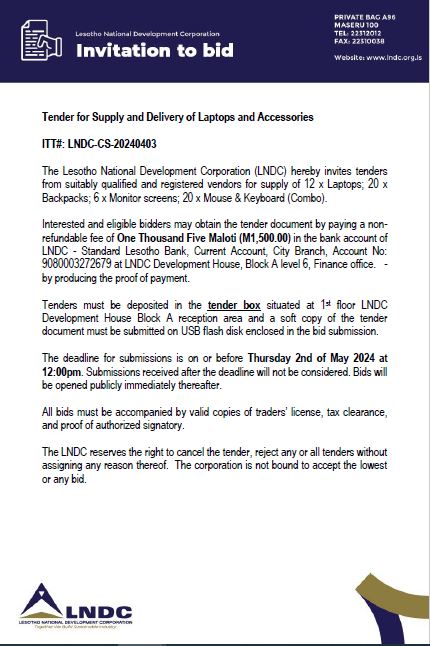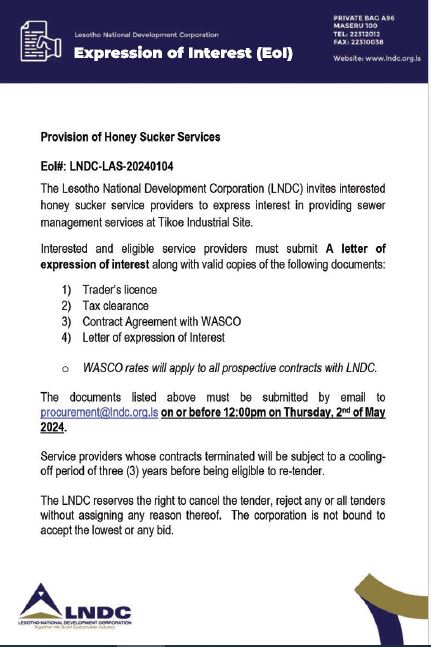…more than 12 000 chickens processed each week
Chris Theko
Mon-Foods, a 100% Basotho owned poultry farm shifted the sector’s paradigm on Friday when they launched a chicken farm and abattoir.
Owning 15 chicken sheds at the Lesotho Agricultural College used for chicken rearing, the business produces about 12000 weekly. The chickens are slaughtered, processed and packaged at Mon-Foods abattoir situated at Ha Thetsane.
The establishment started operating six weeks ago, according to its director Thabo Stephen Monyane, and like any business has had its hurdles.
Last week was the cutting of the ribbon for the business which made its first sale of locally produced chickens. The launch also encompassed a tour of both the farm site and the abattoir.
Addressing guests at the launch event, Monyamane revealed that they are still yet to reach the farm’s full operational capacity, noting that with the work already done, Mon-Foods would be able to produce enough chickens to supply customers every week.
“Every single week we put in chickens for rearing, and this we only started in the second week of September, with the intention of being able to supply the market on a consistent level,†Monyamane said.
The director indicated that the progress of the business was affected by the Covid-19 induced lockdown, saying immediately after they were able to access entry into South Africa, they made a purchase of chicks for rearing.
“We are currently processing the final stages of our hatchery and hopefully by December, we will be hatching our own chicks on the farm to reduce the dependency on South African manufactures.
“The farm has 15 chicken sheds which are divided into three for each batch for breeding purposes,†he explained.
For his part the company’s Farm Manager, Maseli Leche said the biggest chicken shed on the farm has about 15 by 50 metres, housing a total of 2 250 chickens.
He said the strategy of the farm is to produce 12 000 chickens on a weekly basis, but said at the moment they are having a challenge of the supply of chickens where supply is low and the demand is so high.
“Due to the demand and supply challenge, we have not yet reached the maximum capacity of the farm,†Leche said.
The farm manager pointed out that they use Makhulo Chicken Feed which is produced locally “…to ensure that we make use of available resources in the country and to answer the micro economic variables such as the high unemployment rate and also optimise the flow of the currency.â€
Leche stressed a need to produce chicks locally so as to address the supply and demand needs.
“We have decided to primarily source for eggs and we are going to have our own parent stock so as to bridge the supply and demand gap,†he said.
He added, “We have to swiftly prepare to start producing our own fertile eggs and hatch them here in the country.â€
Leche was fast to stress that their competition is South African poultry imports which he noted are much costly when compared to their products.
“Our chickens do not only cost far less than our competition, but our quality is higher than that of chicken produced in South Africa. If you look at chicken product brands from South Africa, they encompass 85% chicken and 15% bran, while ours is 100% chicken and 0% bran, and by that virtue, our product is of a higher quality,†he said.
With the farm situated at the country’s agricultural college, it also serves as a practical learning space for students.
Leche indicated that previously, students in the field of poultry production and farming were struggling to do in practice what they were learning theoretically.
“It is the same farm that used to be called the Lesotho poultry plant, it was the first plant to adopt the broiler chicken thus making Lesotho the first country in Southern Africa to do so and it used to be the biggest exporter of the day old chicks to Botswana, Zambia and Zimbabwe,†he said.
Guests were shuttled to Mon-Foods abattoir which processes 2000 chickens a day.
“We are at the first phase of this entire project, but we already have a capacity of producing 12 000 birds per week and process them for retail, this is on average 2000 birds a day,†Monyamane said.
Prime Minister Moeketsi Majoro’s Economic Advisor, Dr Letete who graced the gala indicated that Lesotho is suffering disgrace from partners because the private sector is not growing.
“Our partners take this country as a disgrace because we did not grow our private sector. We depend on other countries for almost everything and that is solely because we did not stick together to build our private sector, nor build a sustainable food security. It is now time for us to stand and build our private sector,†he said.
He added, “We always thought the government can do it all, unfortunately it failed. The government cannot own businesses, never at least to my best understating. I think we misunderstood the meaning of the government and what it must do. We expected that it will run the hatchery and other businesses and that was a wrong model which was used from 1960 up to 2000 where we realised that we are failing until a decision to sell it.â€
The PM economic advisor stated that for Lesotho to reach its economic potential, it needed young people to rebuild and make Lesotho a place they can take pride in.
“It is only when we can have 10 millionaires each year in this country, that we can say we have made an effort,†he said noting local producers need clean statistics which informs them of how much the country is importing so that they can maximise their products to meet the market demands.
“We need statistics indicating exactly how much we are importing from other countries and then plan together on how we can reduce the import bill. I disagree with the saying that the government is broke, it is us who waste resources for the government and comeback and claim the government has no money,†Letete lashed.
Meanwhile, Finance Minister Thabo Sophonia applauded the company and pointed out that most Basotho businesses fail because of their inability to work as a collective.
“There is a trend where Basotho fail to work together. Each person always thinks for themselves and invests their energy in sabotaging their fellow Basotho business men and women without realising that alone one goes fast but together they can go far,†he said.
“I have been thinking of the factory shells at Ha Belo and am contemplating on suggesting to the LNDC to invest in bigger infrastructure which would serve different sectors. People running poultry business should be given those shells so that they can stop worrying about infrastructure. Surely if each and every district can have a farm the same standard as Mon-Foods this country’s economy will grow to where we want,†the minister indicated.
Sophonia indicated that in as much as government changes many times, even the minister wants to do things faster before she or he can be assigned to go somewhere else, they fail because of their civil servants.
Sophonia said one of the things discovered to have sabotaged privatisation is the formation of boards.
“The government said it’s going out of business but its shares are owned by government people. A lot of weird things happen. In meetings those board members on behalf of the government always defend the investors other than the government.
“I am sorry to have to say this because one of the businesses, Lesotho flour mills for 25 years since its operation it has not given the government of Lesotho even a cent for dividends. This shows that at times Basotho can sabotage their own country,†he said.
“In this country we do not have programs on the development of private sector most importantly on agriculture. The whole country people are focused on political news other than important news that can help build the economy of this country. Until I talked to Monyamane on how he can help to equip youth with skills I did not know about his business, this shows that there is no information dissemination,†he said.
The minister urged, Mon Foods to disseminate information as soon as they can so that a lot of business owners can know that they can get meat supply from the company. Indicating that when information is not sent to the people, that reduces the sales of a business because other people do not know about the poultry farm,





